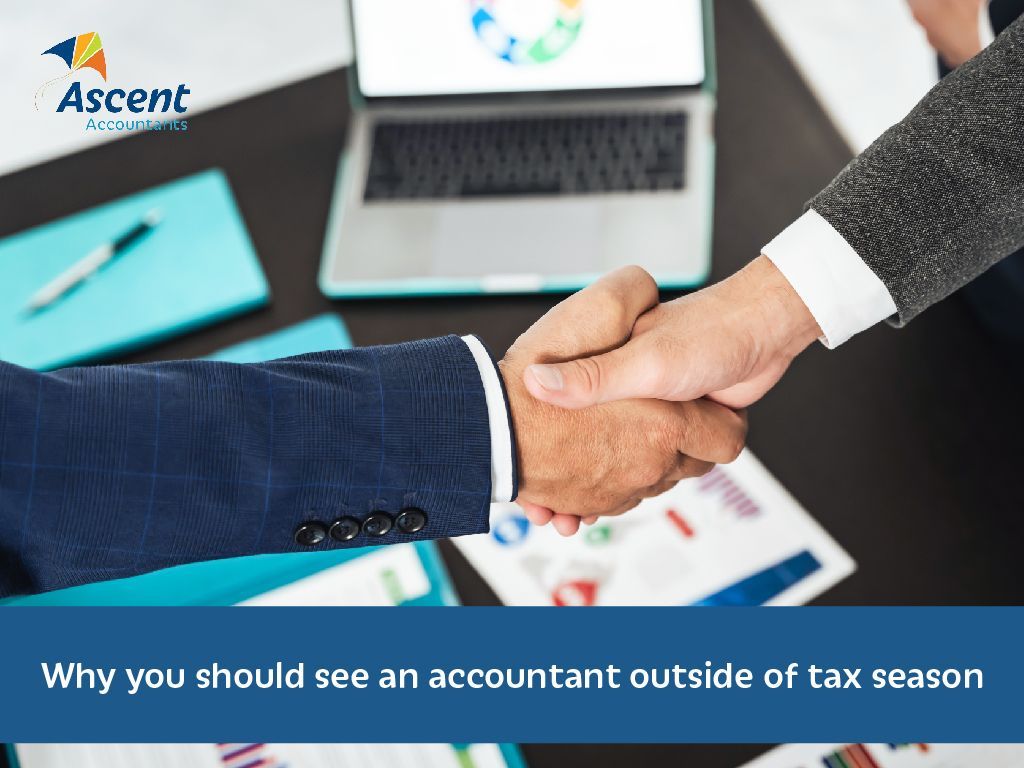Why you should see an accountant outside of tax season

Accountants don’t cease to exist after tax season; there are plenty of reasons we’re open year-round to provide financial services.
Although it might be the last thing on your mind (even amidst tax season), individuals and businesses can gain a lot from a little forward-thinking when it comes to their tax.
As a significant expense for businesses and individuals, income tax requires prudent planning and management. It’s a good idea to check in with your accountant to ensure your tax strategy reflects your current circumstances and goals.
Individual tax planning.
With effective tax planning, you can lower the amount of tax you’re paying and keep more money in your pocket.
By reviewing your tax position outside of tax season, you’ll be able to implement strategies to minimise your tax liability when June 30 arrives. Unfortunately, it’s too late for us to implement a tax plan while preparing your returns.
An accountant will review your tax position, help you to implement strategies to reduce your tax bill and ensure you’re maximising all the benefits you’re entitled to.
In particular, you should consider a review of your tax position if you:
• Made a capital gain on the sale of property or shares;
• Have income over $120,000;
• Are over 55 and not maximising your superannuation contributions;
• Received lump sum bonuses during the year;
• Have the opportunity to salary package at your work;
• Are currently salary sacrificing into superannuation;
• Have a superannuation account which is underperforming;
• Haven’t reviewed your home or investment loans in the past few years;
• Haven’t reviewed your income protection or life insurance requirements in the past few years and/or your personal circumstances have changed;
• Bought a rental property during the year;
• Have equity in property or savings;
• Have positively geared investments in a high-income earner’s name;
• Are interested in starting a property/investment portfolio, including negative gearing to reduce tax.
Business management & tax planning.
Business management and tax planning are two invaluable reasons for business owners to consult with an accountant. Business owners are often so focused on trying to make and retain profits that they neglect the financial health of their business in other ways. There is where an Interim review can help.
An interim review provides you with a snapshot of where your business is at in relation to end-of-year profits and the resulting tax implications. Reviewing these results before the end of the financial year allows you to make appropriate adjustments to ensure you’re paying a minimum (legal) level of taxation.
We strongly encourage you to invest in your business and have an interim review performed as it can benefit you in the following ways:
• Tax planning can save money on your end-of-year tax bills.
• Highlight and solve any issues that may affect your tax returns.
• Reviewing Business Activity Statements ensures you’re paying GST correctly.
• Provide you with a complete financial summary, detailing your net wealth, asset mix and areas of risk.
• Review your business activity and provide guidance with management issues, sales/marketing strategies and financial planning/restructuring.
• Review key performance indicators for the business.
• Assist in working out areas that will unlock cash flow for the business.
• Gives you a forum to query business and tax concerns.
• Gives your accountant a better understanding of your business issues.
As a business owner, there are important things you should know about the operation of your business. You should know your ‘break-even point’ (where total revenue = total costs). You should also be regularly reviewing the difference between your predicted and actual budget. These help you to keep your business profitable and achieve results that match your expectations. With an accountant to help you analyse this, you can determine what is going right or wrong with the business and, if necessary, put strategies in place to rectify it.
Why professional help?
Accountants have a professional advantage when it comes to minimising your tax and maximising your benefits. They know what the rules are and when they change. They can advise you on claiming deductions for expenses, such as rent or bills. Seeing an accountant ahead of June 30 means you’ll be able to plan these payments (e.g., pre-paying them) to give you more disposable cash throughout the year.
The Ascent way.
If you’re looking for help with tax planning, put your finances in the best hands with Ascent. Our brilliant accountants are dedicated to providing excellent advice which considers your unique needs and goals. Get in touch today to get started.
Need help with your accounting?








